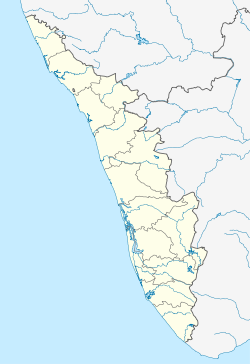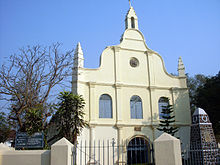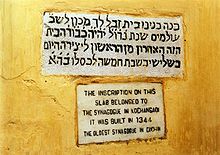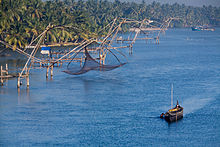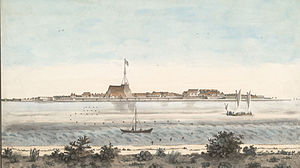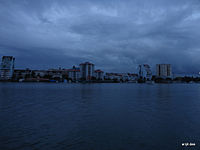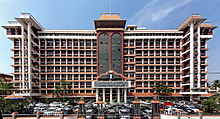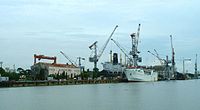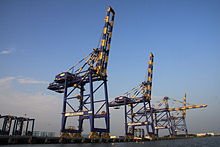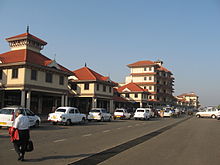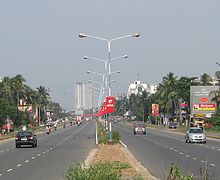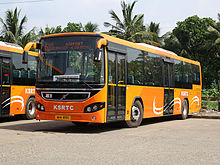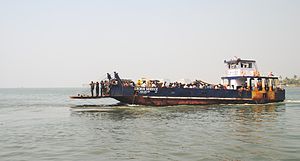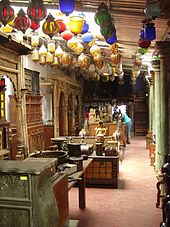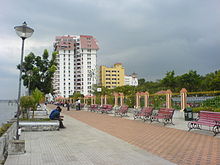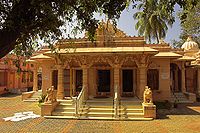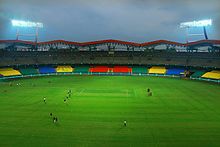
Kochi
About this schools Wikipedia selection
The articles in this Schools selection have been arranged by curriculum topic thanks to SOS Children volunteers. Click here for more information on SOS Children.
| Kochi Cochin |
|||
|---|---|---|---|
| — City — | |||
| From Top Clockwise: Marine Drive Waterfront Skyline, Parikshith Thampuran Museum, Oberon Mall, Chinese Fishing Nets, Vismaya Building in Infopark | |||
|
|||
| Nickname(s): Queen of the Arabian Sea | |||
|
|
|||
| Coordinates: 9.977°N 76.27°E Coordinates: 9.977°N 76.27°E | |||
| Country | India | ||
| State | Kerala | ||
| District | Ernakulam | ||
| Government | |||
| • Body | Corporation of Cochin | ||
| • Mayor | Tony Chammany ( INC) | ||
| • City Police Commissioner | M. R. Ajith Kumar IPS | ||
| Area | |||
| • City | 94.88 km2 (36.63 sq mi) | ||
| • Metro | 632 km2 (244 sq mi) | ||
| Elevation | 0 m (0 ft) | ||
| Population (2012) | |||
| • City | 612,343 | ||
| • Density | 6,340/km2 (16,400/sq mi) | ||
| • Metro | 2,117,990 | ||
| Languages | |||
| • Official | Malayalam, English | ||
| Time zone | IST ( UTC+5:30) | ||
| PIN | 682 XXX | ||
| Telephone code | 91-(0)484-XXX XXXX | ||
| Vehicle registration | KL-7,KL-17,KL-39,KL-40,KL-41,KL-42,KL-43,KL-44, KL-63 | ||
| Coastline | 48 kilometres (30 mi) | ||
| Sex ratio | 1.028 ♂/ ♀ | ||
| Literacy | 97.5% | ||
| Distance from Mumbai | 1,384 kilometres (860 mi) NW ( land) | ||
| Distance from Delhi | 2,594 kilometres (1,612 mi) N ( land) | ||
| Distance from Chennai | 684 kilometres (425 mi) NE ( land) | ||
| Distance from Bangalore | 533 kilometres (331 mi) N ( land) | ||
| Climate | Am ( Köppen) | ||
| Precipitation | 3,228.3 millimetres (127.10 in) | ||
| Website | www.corporationofcochin.net | ||
Kochi ( [koˈtʃːi ]), formerly Cochin, is a major port city on the west coast of India by the Arabian Sea and is part of the district of Ernakulam of the state of Kerala. Kochi is often called by the name Ernakulam, which refers to the eastern part of the mainland Kochi. The civic body that governs the city is the Corporation of Cochin, which was constituted in the year 1967, and the statutory bodies that oversee its development are the Greater Cochin Development Authority (GCDA) and the Goshree Islands Development Authority (GIDA).
The city of Kochi (pop. 601,574) is the most densely populated city in the state and is part of an extended metropolitan region (pop. 2.1 million), which is the largest urban agglomeration in Kerala. Kochi city is also a part of Greater Cochin region and is classified as a B-1 grade city by the Government of India, making it the highest graded city in the state. Kochi ranks first in the total number of international and domestic tourists in Kerala. Kochi has been ranked the sixth best tourist destination in India according to a survey conducted by the Nielsen Company on behalf of the Outlook Traveller magazine. Kochi was one of the 28 Indian cities found to be among the emerging 440 global cities that will contribute 50% of the world GDP by the year 2025, in a study done by McKinsey Global Institute.
The city lies about 220 kilometres (137 mi) north of the state capital Thiruvananthapuram, and about 180 kilometres (112 mi) south of Kozhikode. Heralded as the Queen of Arabian Sea, Kochi was an important spice trading centre on the Arabian Sea coast from the 14th century. Occupied by the Portuguese Empire in 1503, Kochi was the first of the European colonies in colonial India. It remained the main seat of Portuguese India until 1530, when Goa was chosen instead. The city was later occupied by the Dutch and the British, with the Kingdom of Cochin becoming a princely state.
Kochi is home to the Southern Naval Command of the Indian Navy and the state headquarters of the Indian Coast Guard with an attached air squadron, named Air Squadron 747. Commercial maritime facilities of the city include the Port of Kochi, an International Container Transshipment Terminal, the Cochin Shipyard, offshore SPM of the Kochi Refineries, and the Kochi Marina. Kochi is also home for the Cochin Stock Exchange, International Pepper Exchange, major chemical industries like the FACT, TCC, IREL, HOCL and Kochi Refineries, electrical industries like TELK and industrial parks like the Cochin Special Economic Zone and Infopark. Kochi is home for the High Court of Kerala and Lakshadweep, and the Cochin University of Science and Technology.
Toponymy
Ancient travellers and tradesmen referred to Kochi in their writings, variously alluding to it as Cocym, Cochym, Cochin, and Kochi. The Cochin Jewish community called Cochin as Kogin (קוגין), which is seen in the seal of the synagogue which is still owned by the community. The origin of the name "Kochi" is thought to be from the Malayalam word kochu azhi, meaning 'small lagoon'. Yet another theory is that Kochi is derived from the word Kaci meaning 'harbour'. Accounts by Italian explorers Nicolo Conti (15th century), and Fra Paoline in the 17th century say that it was called Kochchi, named after the river connecting the backwaters to the sea. After the arrival of the Portuguese, and later the British, the name Cochin stuck as the official appellation. The city reverted to a closer anglicisation of its original Malayalam name, Kochi, in 1996. However, it is still widely referred to as Cochin, with the city corporation retaining its name as Corporation of Cochin.
History
Kochi was the centre of Indian spice trade for many centuries, and was known to the Yavanas (Greeks and Romans) as well as Jews, Arabs, and Chinese since ancient times. Kochi rose to significance as a trading centre after the port around Kodungallur (Cranganore) was destroyed by massive flooding of Periyar in 1341. The earliest documented references to Kochi occur in books written by Chinese voyager Ma Huan during his visit to Kochi in the 15th century as part of Admiral Zheng He's treasure fleet. There are also references to Kochi in accounts written by Italian traveller Niccolò Da Conti, who visited Kochi in 1440.
According to many historians, the precursor state to Kingdom of Kochi came into existence in early 12th century, after the fall of the Chera Kingdom. The reign of the Kingdom was hereditary, and the family that ruled over the region was known as the Perumpadappu rulers in the local vernacular. The mainland Kochi remained the capital of the princely state since the 18th century. The King of Kochi only had authority over the region encompassing the present city of Kochi and adjoining areas. However, during much of this time, the kingdom was under foreign suzerainty, and the King often only had titular privileges.
Portuguese navigator, Pedro Álvares Cabral founded the first European settlement in India at Kochi in 1500. From 1503 to 1663, Fort Kochi was ruled by Portugal. This Portuguese period was a harrowing time for the Cochin Jews, as the Inquisition was active in Portuguese India. Kochi hosted the grave of Vasco da Gama, the first European explorer to set sail for India, who was buried at St. Francis Church until his remains were returned to Portugal in 1539. The Portuguese rule was followed by that of the Dutch, who had allied with the Zamorin of Calicut to conquer Kochi. By 1773, the Mysore ruler Hyder Ali extended his conquest in the Malabar region to Kochi forcing it to become a tributary of Mysore. The hereditary Prime Ministership of Kochi held by the Paliath Achans ended during this period.
Meanwhile, the Dutch, fearing an outbreak of war on the United Provinces, signed the Anglo-Dutch Treaty of 1814 with the United Kingdom, under which Kochi was ceded to the United Kingdom in exchange for the island of Bangka. However, there are evidences of English habitation in the region even before the signing of the treaty. In 1866, Fort Kochi became a municipality, and its first Municipal Council election was conducted in 1883. The Maharaja of Cochin, in 1896 initiated local administration by forming town councils in Mattancherry and Ernakulam. In 1907, the Governor of the Madras Presidency, Sir Arthur Lawley and his brother, Beilby Lawley, 3rd Baron Wenlock, Governor of Madras, 1891 to 1896, left for an official tour of Cochin and Travancore, which lasted from January 25th to February 14th. On January 26th, they were met by His Highness the Rajah of Cochin who gave a State Dinner in their honour at Ernakulam.
In 1925, Kochi legislative assembly was constituted due to public pressure on the state.
Towards the early 20th century, trade at the port had increased substantially, and the need to develop the port was greatly felt. Harbour engineer Robert Bristow was brought to Kochi in 1920 under the direction of Lord Willingdon, then the Governor of Madras. In a span of 21 years, he transformed Kochi as one of the safest harbours in the peninsula, where ships berthed alongside the newly reclaimed inner harbour equipped with a long array of steam cranes.
In 1947, when India gained independence from the British colonial rule, Cochin was the first princely state to join the Indian Union willingly. In 1949, Travancore-Cochin state came into being with the merger of Cochin and Travancore. The King of Travancore was the Rajpramukh of the Travancore-Cochin Union from 1949 to 1956. Travancore-Cochin, was in turn merged with the Malabar district of the Madras State. Finally, the Government of India's States Reorganisation Act (1956) inaugurated a new state — Kerala — incorporating Travancore-Cochin (excluding the four southern Taluks which were merged with Tamil Nadu), Malabar District, and the taluk of Kasargod, South Kanara. On 9 July 1960 the Mattancherry council passed a resolution—which was forwarded to the government—requesting the formation of a municipal corporation by combining the existing municipalities of Fort Kochi, Mattancherry, and Ernakulam. The government appointed a commission to study the feasibility of the suggested merger. Based on its report, the Kerala Legislative Assembly approved the corporation's formation. On 1 November 1967, exactly eleven years since the establishment of the state of Kerala, the corporation of Cochin came into existence. The merger leading to the establishment of the corporation, was between the municipalities of Ernakulam, Mattancherry and Fort Kochi, along with that of the Willingdon Island, four panchayats ( Palluruthy, Vennala, Vyttila and Edappally), and the small islands of Gundu and Ramanthuruth.
The city's economic growth gathered momentum after economic reforms in India introduced by the central government in the early-1990s. Since 2000, the service sector has energized the city's economy. The establishment of several industrial parks based on IT and other port based infrastructure triggered a construction and realty boom in the city. Over the years, Kochi has witnessed rapid commercialisation, and has today grown into the commercial hub of Kerala.
Geography and climate
Geography
Kochi is located on the southwest coast of India at 9°58′N 76°13′E, spanning an area of 94.88 square kilometres (36.63 sq mi). The city straddles the backwaters, encompassing the northern end of a peninsula, several islands and a portion of the mainland. To the west lies the Arabian Sea, and to the east is the urbanized region in the rest of the mainland area. Much of Kochi lies at sea level, with a coastline of 48 km.
The current metropolitan limits of Kochi include the mainland Ernakulam, Fort Kochi, the suburbs of Edapally, Kalamassery and Kakkanad to the northeast; Tripunithura to the southeast; and a group of islands closely scattered in the Vembanad Lake. Most of these islands are very small, varying in area from 6 km2 to less than 1 km2 (1,500 to less than 250 acres). The state government and the GCDA have plans to include Mala and Kodungaloor in Thrissur district, Angamali, Perumbavoor, Piravom and Kolencherry in Ernakulam district, Thalayolaparambu and Vaikkom in Kottayam and Cherthala in Alappuzha district with Kochi metropolitan limits. The newly formed metropolis would be put under the charge of a new authority called Kochi Metropolitan Regional Development Authority.
Soil consists of sediments such as alluvium, teri's, brown sands, etc. Hydromorphic saline soils are also found in the areas surrounding the backwaters.
Predominant rock types found here are Archaean-basic dykes, Charnockites and Gneisses. An ecologically sensitive area, the Mangalavanam Bird Sanctuary is located in the central part of the city. It has a wide range of mangrove species and is nesting ground for a vast variety of migratory birds.
Climate
Under the Köppen climate classification, Kochi features a tropical monsoon climate. Kochi's proximity to the equator along with its coastal location results in little seasonal temperature variation, with moderate to high levels of humidity. Annual temperatures range between 23 and 31 °C (73–88 °F) with the record high being 38 °C (100 °F), and record low 17 °C (63 °F). From June to September, the south-west monsoon brings in heavy rains as Kochi lies on the windward side of the Western Ghats. From October to December, Kochi receives lighter (yet significant) rain from the northeast monsoon, as it lies on the leeward side. Average annual rainfall is 3,228.3 mm (127.10 in), with an annual average of 132 rainy days.
| Climate data for Kochi | |||||||||||||
|---|---|---|---|---|---|---|---|---|---|---|---|---|---|
| Month | Jan | Feb | Mar | Apr | May | Jun | Jul | Aug | Sep | Oct | Nov | Dec | Year |
| Record high °C (°F) | 35 (95) |
37 (99) |
37 (99) |
34 (93) |
35 (95) |
33 (91) |
35 (95) |
35 (95) |
38 (100) |
35 (95) |
34 (93) |
33 (91) |
38 (100) |
| Average high °C (°F) | 30 (86) |
31 (88) |
31 (88) |
31 (88) |
31 (88) |
28 (82) |
28 (82) |
28 (82) |
28 (82) |
29 (84) |
30 (86) |
30 (86) |
30 (86) |
| Average low °C (°F) | 23 (73) |
25 (77) |
26 (79) |
26 (79) |
26 (79) |
25 (77) |
24 (75) |
24 (75) |
25 (77) |
25 (77) |
25 (77) |
23 (73) |
25 (77) |
| Record low °C (°F) | 17 (63) |
18 (64) |
20 (68) |
21 (70) |
22 (72) |
21 (70) |
21 (70) |
20 (68) |
22 (72) |
20 (68) |
20 (68) |
19 (66) |
17 (63) |
| Precipitation mm (inches) | 21.9 (0.862) |
22.9 (0.902) |
35.3 (1.39) |
124.0 (4.882) |
395.7 (15.579) |
720.7 (28.374) |
697.2 (27.449) |
367.8 (14.48) |
289.4 (11.394) |
302.3 (11.902) |
175.1 (6.894) |
48.3 (1.902) |
3,228.3 (127.098) |
| Source #1: Weatherbase | |||||||||||||
| Source #2: MSN India | |||||||||||||
Civic administration
| Kochi City officials | |
|---|---|
| Mayor | Tony Chamminy |
| Deputy Mayor | Bhadra Satish |
| Police Commissioner | M.R. Ajith Kumar |
The city is administered by the Kochi Corporation, headed by a mayor. For administrative purposes, the city is divided into 74 wards, from which the members of the corporation council are elected for five years. Earlier; Fort Kochi, Mattancherry and Ernakulam were the three Municipalities in Cochin area, which was later merged to form the Cochin Corporation. The Corporation has its headquarters in Ernakulam, and zonal offices at Fort Kochi, Mattancherry, Palluruthy, Edappally, Vaduthala and Vyttila. The general administration of the city is handled by the Personnel Department and the Council Standing committee Section. Other departments include that of town planning, health, engineering, revenue and accounts. The corporation is also responsible for waste disposal and sewage management. The city produces more than 600 tons of waste per day and a large portion of waste is decomposed at Brahmapuram Soild Waste plant into organic manure. The supply of potable water, sourced from the Periyar River is handled by Kerala Water Authority with support of Water works department of Kochi Corporation. Electricity is provided by the Kerala State Electricity Board. The GCDA and GIDA are the government agencies initiating and monitoring the development of Greater Cochin area, mainly in developing infrastructure facilities for the city.
Law and order
Kochi is the seat of High Court of Kerala, the highest judicial body in the state and thus several judicial offices are located here. The Kochi City Police is headed by a Police Commissioner, an Indian Police Service (IPS) officer. The city is divided into five zones and each zone under a circle officer. Apart from regular law & order, the city police comprises the Traffic Police, Narcotics Cell, Riot force, Armed Reserve Camps, District Crime Records Bureau and a Women's Police station. It operates 19 police stations functioning under the Home Ministry of Government of Kerala. An anti-corruption branch of the Central Bureau of Investigation also operates out of the city. CISF maintains 3 squadrons for providing security to various central and state heavy industries, airport and seaport zones. Other major central agencies are NIA, DRI and Indian Customs due to the presence of major port. According to National Crime Records Bureau (NCRB), Kochi reported significant increase of 193.7 per cent IPC crimes in 2010 compared to 2009, and reported a crime rate of 1,897.8 compared to the 424.1 in whole Kerala. However, Kochi Police officials defended that in major crimes such as murders and kidnapping, the city registered a low crime rate even behind other cities in the state.
Politics
Kochi is part of the Ernakulam Lok Sabha constituency. The current elected Member of Parliament representing the constituency is Prof. K V Thomas who belongs to the Indian National Congress. Prof. Thomas is currently holding the portfolio of Minister of State for Consumer Affairs, Food and Public Distribution.
The Ernakulam Lok Sabha constituency elects six members to the Legislative Assembly. Out of this, four constituencies, namely Kochi, Ernakulam,Thripunithura and Thrikkakara represent the city.
Economy
Kochi is widely referred to as the commercial capital of Kerala. Kochi is home to Cochin Stock Exchange, the only stock exchange in Kerala. Federal Bank, the fourth-largest Private-sector bank in India is located in Aluva which is a suburb of Kochi. Being a major online trading centre in the country, SEBI has proposed to open its local office in Kochi.
Availability of electricity, fresh water, long coastline, backwaters, good banking facilities, presence of a major port, container trans-shipment terminal, harbour terminal and an international air terminal are some of the factors which accelerated the industrial growth in the city and its adjoining district. In recent years the city has witnessed heavy investment, thus making it one of the fastest-growing second-tier metro cities in India. Sales tax income generated in the Kochi metropolitan area contributes heavily to state revenue. The district contributes the highest portion, 14.47%, of the state's GDP. Construction and manufacturing combined contributes 37%, and trade, tourism and hospitality together provides another 20%. Major business sectors include construction, manufacturing, shipbuilding, transportation/shipping, seafood and spices exports, chemical industries, information technology (IT), tourism, health services, and banking. Kochi is recognized as one of the seventeen major industrial cities of India by World Bank, Doing Business Group. However, in the 2009 rankings of ease to start and operate a business, among the 17 Indian cities selected, Kochi was rated as the second most difficult city to start business and was ranked 16th, above Kolkata.
As in most of Kerala, remittances from non-resident Indians (NRI)s is a major source of income. Eloor, situated 17 kilometres (10.5 mi) north of the city-centre, is the largest industrial belt in Kerala, with more than 250 industries manufacturing a range of products including chemical and petrochemical products, pesticides, rare earth elements, rubber processing chemicals, fertilisers, zinc and chromium compounds, and leather products. Fertilisers and Chemicals Travancore Limited (FACT), one of the oldest fertilizers and chemical industry in Kerala is located in Kochi. Kochi Refineries of (BPCL) at Ambalamugal is one of the largest oil refining facilities in South India. Petronet India has now almost completed Kochi LNG Terminal, for importing and storing natural gas, for energy and fueling needs. Central Government establishments like the Coconut Development Board, the Coir Board and the Marine Products Export Development Authority (MPEDA) have head offices located in the city.
Like elsewhere in Kerala, tourism is one of the strongest drivers of the local economy. Ernakulam district, in which Kochi is situated, ranks first in the total number of domestic tourists visiting Kerala, and thus contributes to the economy of the city. The tourist enclave at Fort Kochi and presence of several historical monuments, museums etc. as well as natural attractions like the Vembanad lake and the backwaters attract large number of tourists to the city. Presence of several leading hospitality brands have been a major source of employment for locals. The Kochi Port is one of the leading ports where international cruisers call on regularly. The city has the first marina facility in the country Kochi Marina which attracts large number of yacht-totters. Real Estate industry is also one industry which is contributing a lot to the economy of Kochi. Many players have entered the market and have developed residential properties.
Kochi is the headquarters of the Southern Naval Command, the primary training centre of the Indian Navy. The Cochin Shipyard, which was the largest shipbuilding facility in India until 2008, contributes to the economy of the city. The fishing harbour at Thoppumpady is a minor fishing port in the state and supplies fish to local and export markets. To further tap the potential of the all-season harbour at Kochi, an international cruise terminal and several marinas are being constructed.
Exports and allied activities are also important contributors to the city's economy. The Cochin Port currently handles export and import of container cargo at its terminal at Willingdon Island. The International Container Transshipment Terminal operating out of Vallarpadam, is India's largest transshipment terminal. Cochin Port Trust also planning to build an Outer Harbour near Puthuvype. Kochi's historical reliance on trade continues into modern times, as the city is a major exporter of spices and is home to the International Pepper Exchange, where black pepper is globally traded. The Spices Board of India and World Spice Organisation are headquartered in Kochi.
The IT and ITES related industries are growing up in Kochi. Availability of cheap bandwidth through undersea cables and lower operational costs compared to other major cities in India, has been to its advantage. Various technology and industrial campuses including the government promoted InfoPark, Cochin Special Economic Zone and KINFRA Export Promotion Industrial Park operate in the outskirts of the city. Several new industrial campuses are under construction in the suburbs of the city. SmartCity at Kakkanad is the prominent project under proposal. Cyber City at Kalamassery is another integrated IT township SEZ being planned in the private sector.
Kochi has an established electronics hardware industry with companies such as V-Guard Industries, FCI OEN Connectors and SFO Technologies. The Government of Kerala has announced a project to build an industrial park named Electronic City spanning an area of 340 acres (140 ha), to cater to the electronic hardware industries. The private operator NeST is building a Special Economic Zone specifically for electronics hardware spanning an area of 30 acres (12 ha).
The Cochin International Airport is in the process of setting up an aerotropolis at Nedumbasserry.
Transport
Air
The air gateway to Kochi is the Cochin International Airport (CIAL) located at Nedumbassery, which is about 28 km (17 mi) north of Kochi city, and handles both domestic and international flights. It is the first international airport in India to be built without Central Government funds.
The Cochin airport provides direct connectivity to popular international destinations in the Middle East, Malaysia and Singapore and to most major Indian cities apart from tourist destinations like Lakshadweep. Kochi is also the headquarters of the Air India Express service. With a terminal area of 840,000 sq ft (78,000 m2), and a passenger capacity of 1800, it is the largest airport in the state and the fourth busiest international airport in India in terms of international passengers, and seventh busiest overall.
Road
Kochi is well connected to neighboring cities and states via several highways. It is a node in the North-South Corridor of the National Highway system.
National Highways
The NH47 connects Salem to the city of Kochi via Coimbatore, Palakkad and Thrissur and is part of the North-South Corridor of India's National Highway System. The entire stretch of NH47 passing through Kochi and its urban agglomeration has four/six lanes, with some stretches six-laned.
NH17 (now renumbered as NH 66) connects Kochi with Panvel near Mumbai and passes through major junctions like Edappally and Vytilla in the city.
NH966A is a 17.2 km (10.7 mi) four-lane stretch of highway connecting Kalamassery to the Vallarpadam International Container Transshipment Terminal. The four-laning of the stretch is nearing completion and carries 11 major bridges and a grade separated interchange where it branches off NH47. and meets NH17 (now renumbered as NH 66) at Cheranelloor
NH966B is a 6 km (3.7 mi) stretch of highway connecting Kundanoor Junction on the mainland to the Willingdon Island. It is the shortest stretch of highway on the Indian National Highways system.
NH85 connects Kochi to Dhanushkodi in Tamil Nadu passing through Madurai thus providing another link to the North-South Corridor National Highway System.
State Highways
Several state highways also connect Kochi with other parts of Kerala. SH 15, Ettumanoor-Ernakulam Road, connects the city to Kottayam. SH 41, Palarivattom-Thekkady Road, provides a corridor to the eastern parts of the district. SH 63, Vypeen Pallipuram Road and SH 66, Alappuzha – Thoppumpady road are coastal roads that serve the narrow sliver of land between the backwaters and the sea.
City Roads
The main arterial road of the city is Mahatma Gandhi Road in Ernakulam, constructed in 1925 which runs parallel to the coast. Other major roads include Chittoor Road, Banerji Road, Shanmugham Road (in Marine Drive), Kochi Bypass, Kaloor-Kadavanthra Road, Park Avenue, Seaport-Airport Road and S.A Road. A new ring road is proposed for Kochi city by the state government for which a project study is being currently undertaken by NATPAC.
Public Transport
The primary form of public transport within the city is largely dependent on privately owned bus networks. The state-run also operates its services in the city through the Thirukochi service. The major bus terminals in the city are Ernakulam Town, Ernakulam Jetty and the private bus terminal at Kaloor. An integrated transit terminal namely The Mobility Hub at Vytilla is under 2nd phase of construction. The terminal acts as a hub for long distance bus services away from the city centre, and also to provide access to the other public transport facilities.
Kochi is one of the few cities to be granted the new generation air-conditioned low floor and non air-conditioned semi low-floor buses under the JNNURM city transport development project. Call taxis and auto rickshaws (called autos) are available for hire throughout the day.
Development of road infrastructure not keeping pace with the increase in traffic is a major problem faced by Kochi, like most other parts of Kerala.
Rail
The city has two major railway stations – Ernakulam Junction and Ernakulam Town (locally known as the South and North railway stations respectively). The main rail transport system in Kochi is operated by the Southern Railway Zone of Indian Railways, and comes under Thiruvananthapuram Railway division.
The South station is one of the busiest railway stations in South India, with more than 128 scheduled train services daily. The North station situated on the northern side of the city, caters mostly to long distance services that bypass the South station, and also is an additional halt station for many trains. The railway line connecting these two stations cuts the city longitudinally in two, with three narrow bridges connecting the two halves.
Edapally Railway Station is a smaller halt station for passenger services and few express trains. The major station at Aluva, the station at Thripunithura and the halting stations at Kalamassery, Nettoor, Kumbalam and Aroor serve the outskirts of the city and the surrounding metropolitan area.
The spur line to the port and the Cochin Harbour Terminus station are temporarily out of commission because of an accident at the harbour bridge. A spur line exclusively for freight traffic connects the International Container Transshipment Terminal to the main line at Edapally. India's longest rail bridge – the 4.62 km long Vembanad Rail Bridge is also part of this line. In addition, Southern Railways are planning a suburban railway system connecting Kochi to nearby towns and cities, using Mainline Electrical Multiple Unit services, with the first services expected to begin in early 2011 between Kollam and Ernakulam for which works are underway.
There is a historic station named as Ernakulam Terminus(station code:ERG) situated behind the High Court. Great personalities like Mahatma Gandhi and The British Viceroy have visited Cochin through this old railway station. Ernakulam Terminus was the first station to serve the city but had to be abandoned in the early 1960s. Now this station operates as a goods depot of Southern Railway.
Kochi Metro
The Kochi Metro is an under-construction metro rapid transit system for the city of Kochi, intended to considerably ease traffic congestion in the city and its surrounding metropolitan area. It is being set up at an estimated cost of ![]() 5146 crore (US$950 million). Expected to be complete by 2016, the metro system will have 23 stations connecting the suburban towns of Aluva and Thripunithura while passing through downtown Kochi.
5146 crore (US$950 million). Expected to be complete by 2016, the metro system will have 23 stations connecting the suburban towns of Aluva and Thripunithura while passing through downtown Kochi.
On 13 September 2012, Prime Minister Manmohan Singh laid the foundation stone for the Kochi Metro Rail project. The Delhi Metro Rail Corporation (DMRC), with E Sreedharan as principal advisor, has been entrusted to execute the implementation of the Kochi Metro. The project received the central Public Investment Board's green signal in March 2012. The final nod from the central cabinet, to start the project construction, is expected soon. Preparatory works for the system that includes building railway over bridges, repaving roads and land acquisition are in progress.
Ferry
Kochi ranks among India's major seaports, partly due to being one of the safest harbours in the Indian Ocean. The port, administered by a statutory autonomous body known as the Cochin Port Trust, offers facilities for bunkering, handling cargo and passenger ships and storage accommodation.
It also operates passenger ships to Colombo and Lakshadweep. Boat services are operated by Kerala Shipping and Inland Navigation Corporation, the State Water Transport Department and private firms from various boat jetties in the city. The junkar ferry for the transshipment of vehicles and passengers between the islands are operated between Ernakulam and Vypin, and between Vypin and Fort Kochi. However, with the construction of the Goshree bridges (which links Kochi's islands), ferry transport has become less essential. The main boat jetties are Ernakulam Main Boat Jetty near Park Avenue, High Court Jetty in Banerjee Road, Embarkation Jetty in Willingdon Island and Fort Kochi Jetty.
Demographics
With a population of 601,574 As of 2011, the city of Kochi has Kerala's highest population density parameter with 6340 people per km2. As of 2011, Kochi had a metropolitan area population of 2,117,990. Scheduled castes and tribes comprise 14% of the city's population. .The female-to-male ratio is 1,028:1,000, significantly higher than the all-India average of 933:1,000. Kochi's literacy rate is 97.5%. The female literacy rate lags that of males by 1.1%, amongst the lowest such gaps in India.
Kochi's major religions are Hinduism, Christianity and Islam. Jainism, Judaism, Sikhism and Buddhism, with smaller followings, are also practised in Kochi. Though 47% practise Hinduism, Christianity's large following (35%) makes Kochi a city with one of the largest Christian populations in India. The majority of the city's residents are Malayalis. However, there are significant ethnic minority communities including Tamils, Gujaratis, Jews, Anglo-Indians, Sikhs, Konkanis and Tulus. Malayalam is the main language of communication and medium of instruction for primary education, although a number of schools do offer English medium education. The higher education is invariably in English medium, and it is the preferred language in business circles. Tamil and Hindi are widely understood—albeit rarely spoken.
Like other fast-growing cities in the developing world, Kochi suffers from major urbanisation problems, poor sanitation, vector problem, heavy pollution. The city was ranked 10th among Indian cities in terms of house-cost and availability, urban household crowding and household incomes.
Shortage of potable water is a major concern in the city. The situation is aggravated by the threat posed by pollution in industrial areas. Water pollution in Kochi is very high with about 80% of the open wells are polluted. Kochi is also one among the 50 most polluted cities in India, which was ranked 24th by Central Pollution Control Board. The economic boom of the last decade has made Kochi a favourite spot among job seekers. In 2003, the region of the district where the city belongs registered an unemployment rate of 24.5%, roughly 9.7% more than the rate in 1998 which was then the third highest unemployment rate behind state capital Thiruvananthapuram and Kannur. However the economic boom of the ensuing decade saw Kochi soaring into one of the employment hubs of the country, as indicated by various studies in last few years . This has resulted in the a large number of migrants flowing into the city. Kochi is found to have largest share of migrant workers coming to Kerala in search of employment . The economic boom and the flow of migrants has also created a problems of a different kind. The migration has contributed to a growing slum-dwelling population. The government has plans to make the city slum-free by 2016. According to the National Crime Records Bureau, the city holds the fourth position in the number of recorded crimes in India. In 2009, the city recorded an average crime rate of 646.3 against the national average of 181.4. But Kochi City Police Commissioner later clarified that this anomaly was due to higher reporting rates of minor crimes in Kochi than in other Indian cities. The State Crime Records Bureau (SCRB) report gives further credence to this as it finds that Kochi has the least number of crime against women in the state of Kerala. According to the 2011 CII/Institute of Competitiveness report on Liveability, Kochi stands first in the state, and 6th in the country. Kochi is ranked seventh in the list of the top ten most affluent cities in India by 2009 study by Nielsen Company.
Culture
As a result of successive waves of migration over the course of several centuries, the population of the city is a mix of people from all parts of Kerala and most of India. The pan-Indian nature is highlighted by the substantial presence of various ethnic communities from different parts of the country.
Kochi has a diverse, multicultural, and secular community consisting of Malayalis, Konkanis, Gujaratis, Bengalis, Marathis, Punjabis, Tamilians, Biharis and a few families of Jews among other denominations, all living in peaceful co-existence. The city once had a large Jewish community, known as the Malabar Yehuden—and now increasingly as Cochin Jews—that figured prominently in Kochi's business and economic strata. The Syro-Malabar Church, one of the 22 sui iuris Eastern Catholic Churches, has its seat at Ernakulam. The headquarters of the Archdiocese of Verapoly and the Diocese of Cochin are also situated in the city. Prominent places of Christian worship include the St. Mary's Cathedral, the St. Antony's Shrine at Kaloor and St Mary's Bascilica,Vallarpadam. Appropriate to its multi-ethnic composition, Kochi celebrates traditional Kerala festivals like Onam and Vishu along with North Indian Hindu festivals like Holi with great fervour. Christian and Islamic festivals like Christmas, Easter, Eid ul-Fitr and Milad-e-sherif are also celebrated. A merry making fest called the Cochin Carnival is celebrated at Fort Kochi during the last ten days of December.
The residents of Kochi are known as Kochiites; they are an important part of the South Indian culture. However, the city's culture is rapidly evolving with Kochiites generally becoming more cosmopolitan in their outlook. The people are also increasingly fashion-conscious, often deviating from the traditional Kerala wear to western clothing.
Kochiites generally partake of Keralite cuisine, which is generally characterised by an abundance of coconut and spices. Other South Indian cuisines, as well as Chinese and North Indian cuisines are popular. Fast food culture is also very prominent. Being a tourist hotspot, Fort Kochi have a number of restaurants that offer international cuisine, like Italian, French, Mexican etc. Being close to the ocean and the backwaters, Kochi has an abundance of seafood, which reflects in the cuisine. A service known as You Buy, We Cook is available at the waterfront of Fort Kochi, where the fresh seafood purchased from the nets is cooked as per the customers needs. Arabian food joints that serve Shawarma and roasted chicken are a new addition to the fast food scene in the city.
Kochi was home to some of the most influential figures in Malayalam literature, including Changampuzha Krishna Pillai, Kesari Balakrishna Pillai, G. Sankara Kurup, and Vyloppilli Sreedhara Menon. Prominent social reformers such as Sahodaran Ayyappan and Pandit Karuppan also are from Kochi.
The Maharajas of Kochi (then Cochin) were scholars who knew the epics and encouraged the arts. The paintings at the Hill Palace and the Dutch Palace are testimony to their love for arts.
Kochiites are known for their enthusiasm in sports, especially football and cricket. The Jawaharlal Nehru International Stadium in Kochi is one of the large multi-use stadiums in India with international class lighting for football matches. The Regional Sports Centre is an important centre of sporting activity in the city. Kochi is reportedly the 6th best city in India according to the livability index of 2011.
Healthcare
With a large number of advanced tertiary/quaternary care facilities, Kochi has one of the best healthcare facilities in India. It is the prime destination for people seeking advanced healthcare facilities from across Kerala. In recent times, it has attracted a large number of patients from all over India, Middle East, African nations as well as from Europe and United States looking for relatively inexpensive advanced medical care. Kochi is the only city from Kerala that have carried out successful heart transplantations. Amrita Institute of Medical Sciences and Research Centre, Sunrise Hospital Kakkanad, Specialists Hospital Ernakulam, Medical Trust Hospital, PVS Memorial Hospital Kaloor, Lakeshore Hospital, Lisie Hospital are some of the advanced tertiary/quaternary healthcare facilities in Kochi. There are a large number of tertiary/quaternary medicare institutions that are newly coming up in Kochi including Aster Medicity, Rajagiri Institute of Medical Sciences and Medical Trust Institute of Medical Sciences.Citation is empty Other reputed institutions in the city include Ernakulam Medical Centre, KIMS Hospital, Renai Medicity, Lourde's Hospital, Kochi Medical College, and Saraf Hospital. Some of the reputed fertility related treatment centres in India – like Vijaya Hospital, Bourn Hall Clinic and CIMAR – are located in Kochi. General Hospital, Ernakulam is the only notable medical institution in the government sector in Kochi.
Education
Primary Education
The pattern of primary education is essentially the same all over the state. There are government owned schools and government aided schools, which are affiliated to the Kerala State Education Board. A few privately owned schools are also affiliated to the system. Most of the schools owned by private organizations or individuals are affiliated to the Central Board for Secondary Education (CBSE). Indian Certificate of Secondary Education (ICSE) have some schools affiliated to them as well. The state education board offers both Malayalam and English medium instruction, while the other boards offer English medium alone. There are a few schools that follow international curricula, such as IB and IGCSE.
There 34 government schools, 67 private aided schools and 31 unaided schools affiliated to the Kerala State Education Board in the city and suburbs. There are 62 CBSE Schools, 2 IGCSE and 9 ICSE Schools as well.
The general pattern of education is ten years of common schooling to reach the secondary level. Kindegartens are widely available, but considered separate from formal schooling, and generally unregulated. After the secondary level, three streams, namely Arts, Commerce or Science are offered for higher secondary education. After finishing the school, students can opt for higher education related to the streams they had undergone for higher secondary schooling.
The notable schools in the government sector are Sree Rama Varma High School, Edappally High School, Government School-Kochi and Govt Girls High School. There are Kendriya Vidyalaya, Chinmaya Mission and Bharatiya Vidya Bhavan run several quasi-private charter schools within the city limits, as well as in the suburbs. There are several fully private schools that are owned by secular and religious trusts which are of particular renown, such as The Delta Study, Rajagiri Public School, Cochin Refineries School, Toc-H Public School, Global Public School, Choice School, Vidyodaya School , Mar Thoma Public School and Nava Nirman Public School.
Higher Education
The Cochin University of Science and Technology (CUSAT) is a major university named after the city. Most of the colleges in Kochi offering tertiary education are affiliated either with the Mahatma Gandhi University or with the Cochin University. Kochi has one of the campuses of the Indian Maritime University at Willingdon Island. Sree Sankaracharya University of Sanskrit in Kalady is a research oriented university located at the outskirts. Other national educational institutes include the Central Institute of Fisheries Nautical and Engineering Training, the National University of Advanced Legal Studies, the National Institute of Oceanography and the Central Marine Fisheries Research Institute.
Kochi has some of the leading B-Schools in the region. The Indian Institute of Management Kozhikode (IIMK) has set up its first satellite campus at Athulya building in InfoPark, Kochi. Cochin University's School of Management Studies (SMS) is the first and oldest managerial education institution in South India. SCMS Cochin is one of the emerging B-Schools in the country. Another major B-School XIME is opening a new campus in Kochi. Other leading managerial institutions include Rajagiri Centre for Business Studies, Kochi Business School, Amrita School of Business, Albertian Institute of Management and Toc-H B school.
The city and outskirts are home to four medical schools — Amrita Institute of Medical Sciences and Research Centre at Elamakkara, Cochin Medical College at Kalamassery, Sree Narayana Institute of Medical Sciences, M.O.S.C. Medical College, Kolenchery. Some of the prestigious general colleges are Maharaja's College, St. Albert's College, St. Teresa's College, Sacred Hearts College, Bharata Matha College, Aquina's College and Cochin College. The major Engineering and Technology colleges in the city and suburbs are CUSAT Engineering Schools, Model Engineering College and Mar Athanasius College of Engineering(MACE) at Kothamangalam on the outskirts.
Being the seat of the High Court of Kerala, several top legal education institutes are here. The Government Law College-Ernakulam is one of the oldest law schools in Kerala. The School of Legal Studies (SLS), CUSAT is one of the leading Graduate, post-graduate, and research institute in the country. The prestigious National University of Advanced Legal Studies (NUALS) is located in the city.
Social service organisations
Some of the main orphanages and rehabilitation shelters in Cochin City are Palluruthy Relief Settlement in Palluruthy Veli, Don Bosco Sneha Bhavan, Don Bosco Big Boys, Crescent Girls Orphanage, YMCA Boys Home, Bal Bhavan, Valsalya Bhavan.
Palluruthy Relief Settlement is under Corporation of Cochin and managed in association with Peoples Council for Social Justice. There are about 300 inmates and many of them are mentally ill. The night shelter for women run by Corporation of Cochin near Kerala State Road Transport Corporation bus stand provides free and safe accommodation. Peoples Council for Social Justice was found in 1985 under the patronage of Justice V. R. Krishna Iyer with the aim to work for human rights protection, free legal aid and to strive for social justice.
The orphanages for children under Don Bosco Sneha Bhavan Cochi are Sneha Bhavan Annexe, SnehaBhavan, Valsalya Bhavan, Don Bosco and Bosco Nilayam. The Childline India project in Cochin is taken in collaboration with Don Bosco. Children in distress and in need of help can contact in '1098' (toll free number). Sneha Bhavan Annexe is the first point of contact with children and children can stay as a safe night shelter. Sneha Bhavan is a home for the children from the streets and for those from unhealthy and risky situations. The Valsalya Bhavan centre is solely for the girls who are rescued from the streets. Runaways, street children, children of sex workers, abused children and child labourers all live here. Along with primary and high school education at a local school, the centre provides shelter, food, clothing and educational support.
There are many good people doing independent social service. The Italian Sister Sabiola conducts a home at Fort Cochin known as "Ashwasa Bhavan", for young orphaned children. Br. Judson run his own mobile bath in his vehicle for the abandoned: His "Mobile Bath Service" moves around Kochi mornings and in evenings to clean and clothe people living on the streets. Judson washes and cleanses their wounds, provides them new clothes and food, and takes them to shelters in the city.
Sports
Like elsewhere in Kerala, football is the most passionate sport among locals. Kochi is home to two of India's major professional football teams, FC Kochin and Chirag United Kerala and also teams like Josco FC since 2008.
India's fourth largest stadium and third largest cricket stadium, the Jawaharlal Nehru International Stadium located in Kaloor, is a major facility for football and cricket. Recently, the stadium was renovated to facilitate more cricket tournaments as well as for hosting IPL Matches. Kochi was home to the Indian Premier League cricket team, the Kochi Tuskers which won franchise rights to play IPL which participated in the 2011 edition of IPL. Sreesanth who plays for the Indian National Cricket team hails from Kochi.
The Maharaja's Stadium located on MG Road in the heart of the city, is the major athletic facility in the state with synthetic tracks and turf grass as per international standards. The Ambedkar stadium, maintained by GCDA, will be developed exclusively for Football with funds from Government of Kerala and FIFA. Spanish club Real Madrid has proposed to set up a football school in Kochi.
The Rajiv Gandhi Sports Complex at Kadavanthara is a major indoor stadium, mainly used for conducting badminton, tennis and basketball tournaments. The 25m X 10m swimming pool at the centre is one of the larger water sports facility in the state, where regular swimming competitions and coaching are conducted.
The FACT Grounds at Udyogamandal, Sacred Heart's College Grounds and St.Albert's College Grounds are the other major training facilities for various games like volleyball, badminton, cricket etc.
Kochi has two golf courses in the city, and one in the suburbs. The oldest golf club is located at Bolgatty Palace constructed in 1903, which is a nine hole facility run by Cochin Golf Club society. The Cochin Golf and Country Club located near to Cochin Airport, operated by CIAL, is Kerala's first 18 hole golf course with a playing area of over 7,200 yards. The first phase of the all-weather golf course comprising nine holes was opened in May 2010 for members and public. The expansion to a 18 hole course is progressing, which is scheduled to be open in September 2012. The nine hole golf course at the Naval Base is restricted only for military personnel.
Being surrounded by water bodies, the city is ideal for Yachting. The Kerala Yachting Association and the Cochin Yacht Club are located in the city. Both organizations conduct regular yachting tournaments. Kochi was the only Indian city chosen for stopover during the Volvo Ocean Race 2008.



